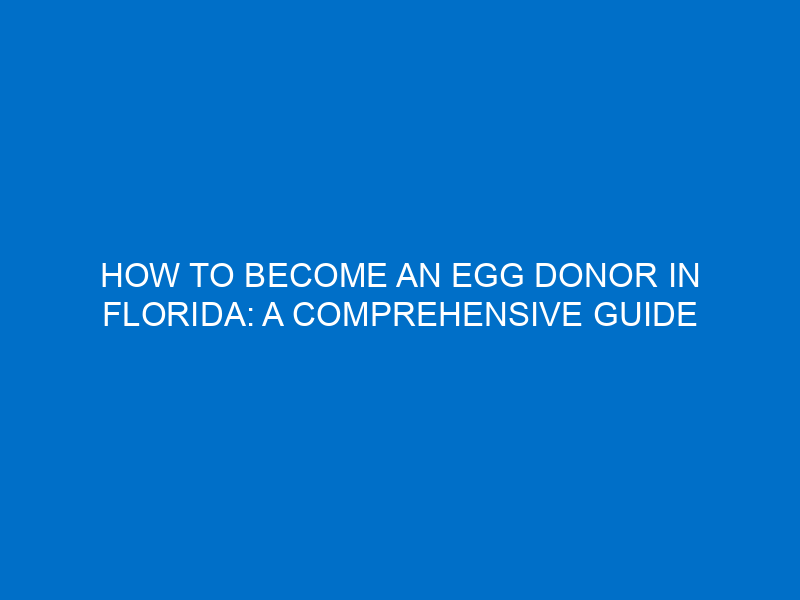Are you considering becoming an egg donor in Florida? If so, you’re not alone. According to the Centers for Disease Control (CDC), there were over 6,000 egg donor cycles in the U.S. in 2018, with Florida ranking third in the nation for the most egg donations.
Egg donation is a generous act that helps infertile couples become parents and experience the joys of parenthood. However, becoming an egg donor is a big decision — so it’s important to make sure you understand the process and the requirements before moving forward.
In this guide, we’ll discuss the process of becoming an egg donor in Florida, including the legal, medical, and psychological aspects. We’ll also answer some frequently asked questions at the end. Let’s get started!
What Is Egg Donation?
Egg donation is the process of giving a woman’s eggs to a couple or individual who is unable to conceive or carry a pregnancy to term using their own eggs. The donated eggs are used to create embryos, which are then transferred to the recipient’s uterus.
This procedure is often used by women who are unable to produce their own eggs due to medical conditions, such as early menopause or ovarian failure. It is also used by couples who are carriers of genetic diseases, or who have experienced recurrent miscarriages.
Who Can Donate Eggs in Florida?
In order to become an egg donor in Florida, you must meet certain requirements. First, you must be a woman between the ages of 21 and 35. You must be in good physical and mental health, and free of any communicable diseases.
You must also have a valid driver’s license or state-issued ID, and be able to provide proof of your identity. You must also be a US citizen or permanent resident and live in Florida.
What Is the Egg Donation Process in Florida?
If you meet the requirements, the first step in becoming an egg donor in Florida is to complete an application. This will include providing information about your medical history, lifestyle, and family background. You will also be asked to provide a sample of your blood and urine for testing.
Once your application is approved, you will be matched with a recipient couple or individual. You will then go through a series of medical and psychological evaluations, including an ultrasound to check the size and quality of your eggs.
If you pass the evaluations, you will be asked to sign a legal contract that outlines your rights and responsibilities. Once the contract is signed, you will begin the egg donation process. This will involve taking medications to stimulate your ovaries to produce multiple eggs.
The eggs will then be collected during a minor surgical procedure. After the eggs are collected, they will be fertilized with the sperm of the recipient’s partner, and the embryos will be transferred to the recipient’s uterus.
What Are the Benefits of Egg Donation?
Becoming an egg donor in Florida has numerous benefits. Not only can you bring joy to a couple or individual who is unable to conceive, but you will also be compensated for your time and effort. Most egg donors in Florida receive $8,000 to $10,000 for each egg donation cycle.
You will also be able to learn more about your own fertility and health, as the process will involve thorough medical and psychological evaluations.
Frequently Asked Questions about Becoming an Egg Donor in Florida
How long does the egg donation process take?
The egg donation process typically takes three to four months from start to finish. This includes the application process, medical evaluations, taking medications, and the collection of eggs.
How many eggs are collected during each cycle?
The number of eggs collected varies from cycle to cycle. However, most donors produce between 10 and 20 eggs per cycle.
Will I have to take time off work?
Yes, you will need to take some time off work for the medical evaluations, egg collection, and recovery. Most donors take one to two weeks off work during the process.
Do I need a lawyer to review my contract?
No, you are not required to have a lawyer review your contract. However, it is recommended that you seek legal advice if you have any questions or concerns about the agreement.
Will my identity be kept confidential?
Yes, your identity will be kept confidential. Most egg donor programs in Florida use anonymous donor programs, so the recipient will not know your identity.
Are there any long-term risks associated with egg donation?
The long-term risks associated with egg donation are minimal. Most donors experience no complications or side effects from the medications or egg collection procedure.
Final Thoughts
Becoming an egg donor in Florida is a generous act that can bring joy to couples or individuals who are unable to conceive. The process is relatively simple and involves a series of medical and psychological evaluations.
Most egg donors in Florida receive $8,000 to $10,000 for each egg donation cycle, and the process typically takes three to four months from start to finish. If you meet the requirements and are interested in becoming an egg donor in Florida, contact a local fertility clinic for more information.


